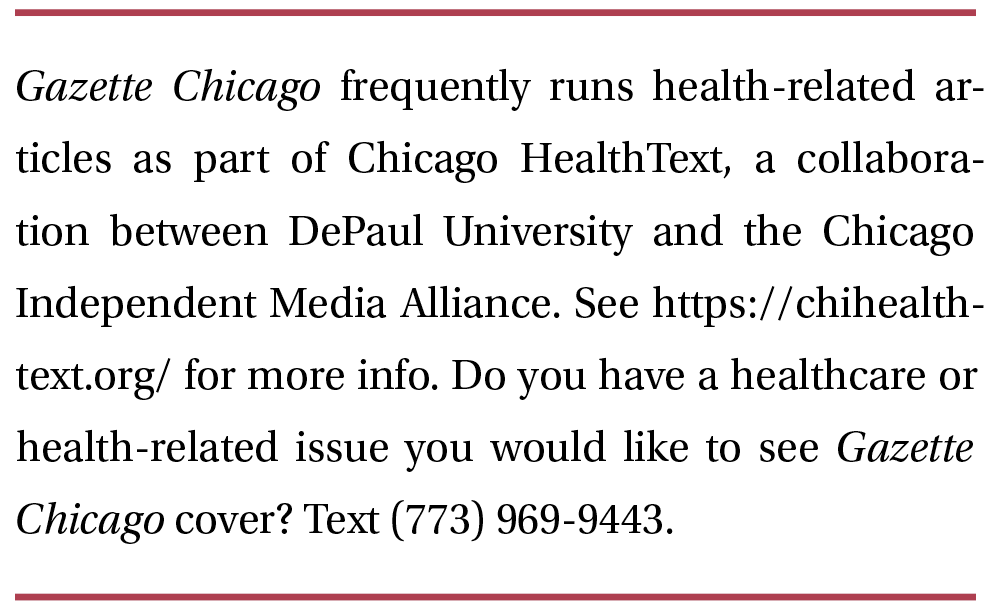By Rodrigo Hernandez
State Senator Robert Peters (D-13th) introduced a recently passed law that allows medical professionals to get more fentanyl test strips for individuals who use opioids. The law supports the Overdose Prevention and Harm Reduction Act of 2019. The State also now requires that medical offices allow only designated employees such as physician assistants and advanced practice registered nurses to access medical supplies. Gov. JB Pritzker signed the bill into law June 9.
HB 4556 promotes getting test strips into the hands of any Illinoisan who needs them to detect the presence of fentanyl and prevent accidental overdose deaths.

“This reform will help save lives,” Peters said. “We still have a long way to go, but removing penalties organizations face when they have access to test strips is a responsible way to address the opioid crisis and to create real public safety for all instead of continuing the misguided policies of the past.”
Medical staff from the Chicago Department Public Health (CDPH) and an assistant professor of pharmacy practice discussed opioid use disorder and the effects of providing additional fentanyl test strips.
Wilnise Jasmin, MD, CDPH medical director of behavioral health, defined fentanyl as “a type of synthetic opioid that is a prescription medication and is also illicitly manufactured in unregulated settings,” noting that fentanyl is approximately 50 to 100 times more potent than heroin and morphine, making it highly addictive.
Reversing fentanyl overdose
She stressed that fentanyl can be lethal. “Its high potency can easily cause a person to experience an overdose and die from an overdose,” said Jasmin, adding that, if administered in time, naloxone or Narcan is effective in reversing a fentanyl overdose.
Sarah Richardson, grants research specialist in CDPH’s office of substance use, explained CDPH’s role and current initiatives, noting the department is investing in programs to address substance use disorder, including activities that address harm reduction for opioid use. Richardson also noted CDPH offers harm reduction interventions to prevent opioid overdose.

“CDPH distributes naloxone, the opioid overdose reversal medication, to community partners and individuals citywide,” she said. “We partner with Chicago Public Library to make Narcan (naloxone) available at libraries in communities most impacted by overdose.”
CDPH offers fentanyl test strip training and education to distributing agencies and partner organizations and has begun holding community test kit building events to engage community members across the city around this issue. Community members at the events help distribute test kits while learning about opioids, overdose, and the co-occurrence of mental health conditions and substance use disorders.
Richardson stressed that anyone who needs Narcan can visit selected Chicago Public Libraries. Also, “CDPH funds several organizations to offer street outreach in these areas of high overdose, responding rapidly to changes in overdose trends and overdose spikes to get people Narcan [naloxone] and link them to needed substance use treatment and medical care,” she explained.

CDPH also funds the Chicago Recovery Alliance (CRA) for operating a drug testing program. Richardson stated individuals can bring their drugs to CRA’s expert drug testing technician to test for an array of substances, including fentanyl and many fentanyl analogues.
In addition, CDPH and the Illinois Department of Human Services recently launched MAR NOW (Medication Assisted Recovery NOW), an innovative treatment program that takes advantage of newly loosened restrictions around medication access to offer telephonic prescription of medications to treat opioid use disorder. MAR NOW provides a treatment hotline, available 24/7, through the Illinois Helpline for Opioids and Other Substances. Anyone in Chicago can call the hotline and be connected immediately to a provider who can prescribe medication over the phone or connect the caller to same-day in-person treatment. Call (833) 234-6343 and ask for MAR NOW.
Such cooperative efforts are helping more people get the support they need while revealing additional ways to improve access to treatment. As Richardson said, “Together with these community organizations, we examine trends in opioid overdose and discuss ways to improve low-barrier linkages to treatment across organizations.”
Expanding access to fentanyl strips
Expanding access to fentanyl test strips is a “key harm reduction initiative,” she continued. “Fentanyl test strips allow people who use drugs to test the substances that they are using for the presence of fentanyl and make informed decisions to keep themselves safe based on the results of the test.” Fentanyl is being found increasingly not only in heroin but cocaine and illicitly produced benzodiazepines.
Education outreach helps communities stay up to date about opioid use disorder, treatment, and related topics. “As CDPH distributes fentanyl test strips to the community, we have opportunities to discuss opioid use disorder, educate on the signs of an opioid overdose, train individuals on Narcan [naloxone] administration, and dissuade myths about fentanyl,” Richardson noted.
“Overdose is preventable, and there are many resources available in Chicago for individuals that are struggling with opioid addiction,” she concluded.
Busting a myth
Jennie B. Jarrett, PharmD, clinical pharmacist at Community Outreach Intervention Projects, and assistant professor at the University of Illinois Chicago College of Pharmacy, dispelled the myth of passive fentanyl overdose, noting some people believe “the idea that if you touch fentanyl, you can overdose with fentanyl. There’s lots of literature and evidence out there that does not support this.”

Jarrett emphasized how harmful spreading misinformation can be. “I think it is a scare tactic reinforcing negative stigma regarding drug use for people to talk about how potentially someone in the community touched fentanyl and then died of a fentanyl overdose,” she said. “That just doesn’t happen, and passive fentanyl absorption is truly not possible.”
She supports educating the community about fentanyl, treatments, and reversal agents. “I think that’s something of note to make sure that the community knows that, just because someone they know may be using fentanyl, doesn’t mean that if they touch it they would be at risk as well,” Jarrett said.
Jarrett agreed with her colleague, Jasmin, saying, “Naloxone is the reversal agent for fentanyl, and it is an excellent way to help support people who potentially are overdosing…[with this antidote], the community can really be prepared and help keep people safe.”
For more information on Narcan and fentanyl test strips, email [email protected]. To access immediate treatment through the Illinois Helpline, call (833) 234-6343 and ask for MAR NOW. To learn more about opioids, addiction, and available resources, visit https://overcomeopioids.org/. For information on Chicago opioid data, visit the Chicago Health Atlas at https://chicagohealthatlas.org/
For Jarrett, email [email protected]. For Jasmin, call (312) 747-9762. For Richardson, email [email protected].
For the Federal Substance Abuse and Mental Health website, log on to www.samhsa.gov/find-help/national-helpline.
Editor’s note: If you have a health-related issue you would like Gazette Chicago to cover as part of its participation in the DePaul University/Chicago Independent Media Alliance Chicago HealthText project, text (773) 969-9443.
